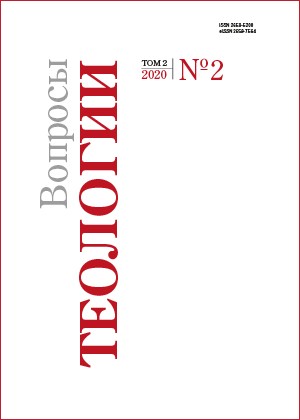Deontological provision of spiritual assistance to patients with chronic and incurable diseases
DOI:
https://doi.org/10.21638/spbu28.2020.205Abstract
The article explores some issues of providing professional pastoral care to HIVinfected hospital patients. Arguments are provided and the validity of the use of the term “pastoral deontology” is justified. A comparison is made of medical and pastoral professional activities along the lines of implementing the scenario of the relationship “providing assistance — receiving assistance”, as well as a comparison of the principles underlying the performance of medical and pastoral duty. It is argued that the concept of pastoral deontology in the counseling of people with chronic and incurable diseases, as a new scientific trend, suggests that this discipline is akin to medical deontology and should be based on the principles of medical deontology, but at the same time it should develop the principles in relation to the practice of pastoral care of sick people. For full cooperation between the Church and medicine, the help coming from the Church should be built into existing state medical structures, play a subordinate role to them, have a reliable working methodological basis, and be set forth in a language that is understandable to the medical community. At the same time, the methodological basis of pastoral care for HIV-infected people should be based on the use of the accumulated theoretical and practical experience of the spiritual care of such people, consist of behaviors and actions by pastors that will help to establish positive contact with patients, relieve their stress, inspire confidence in the individual providing assistance, help patients cope with spiritual problems, and motivate them to receive treatment prescribed by a doctor. Based on the results obtained during the analysis of data from surveys of both experts and HIV-infected patients in the hospital, the article shows that pastoral care for HIV-infected patients by priests of the Russian Orthodox Church has a positive effect on their physical condition, thanks to mobilization of the body’s defense system in confronting the infection. This results in an improvement in the patient’s quality of life and contributes to the development of motivation to create an optimistic attitude.
Keywords:
pastoral deontology, spiritual care, methodological basis, HIV-infected people, hospital, patient, help, charity
Downloads
References
References
Downloads
Published
Issue
Section
License
Articles of "Issues of Theology" are open access distributed under the terms of the License Agreement with Saint Petersburg State University, which permits to the authors unrestricted distribution and self-archiving free of charge.




